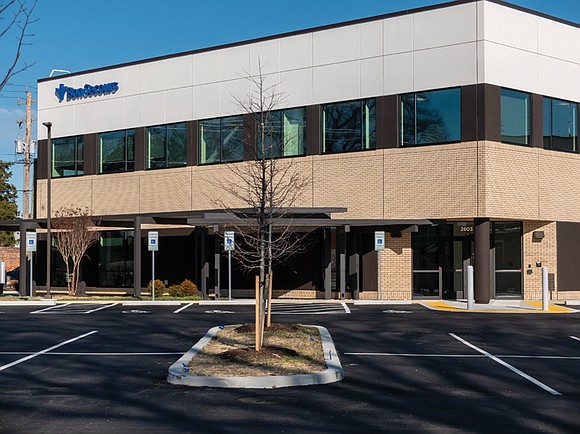Annual checkup
A year after scathing New York Times article, Bon Secours’ prescription for East End community includes jobs, training, upgraded facilities
Jeremy M. Lazarus | 10/12/2023, 6 p.m.
Richmond Community Hospital continues to buzz with construction as its owner, Bon Secours, builds up operations at the East End health care center.
The hospital system also is undertaking a major employee recruitment effort with the city’s Office of Community Wealth Building to fulfill its promise to diversify its work force and provide job opportunities for people living near the hospital.
All of the projects are part of Bon Secours’ efforts to carry out a three-year plan to upgrade health offerings and services at the 104-bed hospital that it purchased in 1995 from a group of Black doctors. The projects also are intended to end criticism that Bon Secours used Richmond Community as a cash machine for the rest of its Richmond-area operations.
A year ago, the New York Times alleged Bon Secours offered a prime example of hospital systems using operations in low-income areas to gain revenue from a federal drug discount program, 340B, to expand operations in middle- and upper-class areas.
“Profits Over Patients: How a Hospital Chain Used a Poor Neighborhood to Turn Huge Profit,” the New York Times headline read in the Sept. 24, 2022, article.
The 340B program allows hospitals to buy expensive cancer drugs at a steep discount and bill insurance companies full price, generating a stream of revenue that is to be used to improve services in areas with high levels of poverty.
Although Bon Secours said it does just that in stoutly rejecting the newspaper’s assertion, the allegations have caught the attention of Louisiana Republican Sen. Bill Cassidy, a physician.
He has begun an investigation into the use of 340B funds by the Bon Secours Richmond operation and the Cleveland Clinic through the Senate’s health committee on which he is the ranking minority member.
Bon Secours, which has asserted that it operates its 340B program through Richmond Community “with the highest level of integrity,” plans to cooperate with the senator’s inquiry in an effort to dispel what it calls “a misleading picture of the high-quality, compassionate care that the hospital provides to the city of Richmond and the East End.”
Meanwhile Bon Secours continues to move forward on plans in development well before the Times’ article appeared.
After opening a $16.5 million office building on the campus earlier this year, Bon Secours now has a $4.5 million project underway to install a new magnetic resonance imaging (MRI) suite in the hospital to replace equipment that failed in 2022, as well as a temporary replacement.
Another $2 million is being spent to install an urgent care center that is to open by early January in the new office building.
Additional expenditures are being made to spruce up the hospital’s campus at 28th Street and Nine Mile Road, according to Bon Secours.
Separately, a recruitment initiative is set to launch next Saturday, Oct. 21, with a job fair from 10 a.m. to 2 p.m. at the Bon Secours Sarah Garland Jones Center, 2600 Nine Mile Road, it has been announced.
The hospital system, which previously only paid for current employees seeking to move up or change jobs to enroll in educational programs, now plans to offer that same benefit to applicants who need additional training and certifications.
The hospital system, according to a Bon Secours spokesman, has begun offering paid tuition to people seeking positions in fields ranging from nursing and nursing support positions to medical assisting and laboratory and respiratory positions. Also, tuition coverage will expand next year for careers such as pharmacy tech and surgical technology, Bon Secours stated, as well as for foundational programs such as the GED or high school equivalency.
Such initiatives have tended to quiet, though not silence Bon Secours’ most severe local critics, notably the Richmond Coalition for Health Care Equity (RCHCE), which used the New York Times article as a springboard to lobby Bon Secours to use the 340B savings to improve health care in the East End and other low-income areas.
The addition of an on-site pharmacy and the restart of obstetrics and gynecology services on the Richmond Community campus are among ways Bon Secours is carrying out its plan.
Bon Secours also has established new protocols to simplify the transfer from its emergency room of patients needing more intensive care than it can provide. It is working to create an outpatient clinic of health issues involving the brain, feet and crucial hormones as well as offering surgery, cancer treatment and lung care, according to the hospital.
Responding to the Bon Secours’ initiatives, the RCHCE stated again that it is “encouraged by Bon Secours’ progress on its commitment to make much needed improvements to medical services available at Richmond Community Hospital, and in diversifying its medical and support workforce and its suppliers.”
Despite the praise, the coalition cautioned that it still believes “Bon Secours continues to underperform in the area that triggered the storm of negative media coverage and community uproar: its lack of transparency regarding the amount of money it makes through Richmond Community Hospital’s participation in the federal 340B discounted drug pricing program, and the extent to which that money is reinvested in RCH and the medically needy Richmond City community it serves.”
The coalition concluded that it would “soon have more to say based on (survey results) of East End residents’opinions regarding Richmond Community Hospital and its services.”







